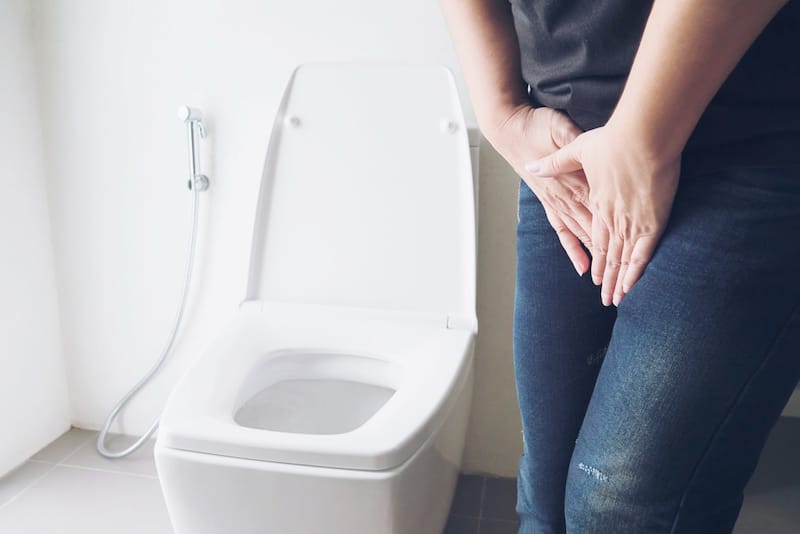Several conditions may cause sneeze-induced ovarian pain. For example, it may be because your ligaments have been strained, you have ovarian torsion, bladder infection, endometriosis, pelvic inflammatory disease, ovarian cysts, ovarian cancer, or ectopic pregnancy.
The pain you feel when sneezing may not actually come from your ovaries — it’s your abdomen that hurts.
During this forceful action, the ligaments which suspend your ovaries on the sides of your body get strained, thus giving you a sharp, jabbing pain in your abdomen.
Women experience this kind of pain because the ligaments that support our ovaries are also responsible for holding up the uterus and other abdominal organs.
So, when it comes to sneezing, these ligaments are stretched and strained due to the sudden increase in pressure around them.
This causes mild to severe pain in the abdomen area when sneezing frequently occurs or at short intervals of time.
7 possible reasons for pain in the ovaries when sneezing
Here are some other reasons you might feel pain while sneezing:
1. Ovarian torsion
Pain on your ovaries when sneezing or coughing may also be caused by ovarian torsion.
Ovarian torsion is a condition in which the ovary twists on its axis, causing pain, nausea, and vomiting. It can occur when you cough or sneeze and injure your ovaries.
This can happen if they are caught between the wall of the uterus and the fallopian tube, making them twist around on their attachment points.
You can tell if you have this condition because it causes sharp, stabbing pains in your abdomen. These pains often get worse when you cough or sneeze.
They may also be described as feeling like someone is twisting an egg between two fingers with each breath. The pain worsens as time passes and may last several hours even after you’ve stopped coughing or sneezing.
If you experience pain in your abdomen that lasts more than 24 hours after coughing or sneezing, seek medical attention immediately!
2. Bladder infection

A bladder infection can be the reason behind the pain in your ovaries.
The pain is usually mild to moderate and can range from a dull ache to sharp, stabbing pains that radiate from the area of the ovary.
Medical aid is needed if someone experiences any of these symptoms.
3. Ovarian cancer
Another reason behind feeling pain in your ovaries while sneezing or coughing can be ovarian cancer.
Ovarian cancer is a type of cancer that usually affects women between the ages of 40 and 60. Ovarian cancer develops when cells in the ovary grow abnormally.
A woman can get ovarian cancer if she has one or more eggs in her ovaries and if her ovaries are normal, but the cells that make up those eggs start to grow out of control.
The cells become malignant (cancerous) and start spreading throughout the body by forming tumors, which can then spread to other body parts through blood vessels or lymphatic vessels (tiny blood vessels that carry lymph fluid).
The symptoms most often associated with ovarian cancer include pelvic pain, blood in urine, abdominal bloating, back pain, fatigue, and weight loss. These symptoms may also occur before any other signs appear.
4. Endometriosis
Endometriosis is a condition in which tissue that normally lines the inside of your uterus grows outside of it.

It can cause pain and other symptoms, including menstrual cramps, bloating, and infertility.
Endometriosis can occur in the ovaries, fallopian tubes, and other areas of your reproductive system.
It’s common for this condition to affect women who have had a pelvic inflammatory disease (PID) or an ovarian cyst in the past. But it can also occur in women who have no history of PID or an ovarian cyst.
If you have endometriosis, you may experience pain in your ovaries when sneezing or coughing.
5. Pelvic inflammatory disease
Pelvic inflammatory disease (PID) can affect the ovaries, which are located in the pelvic cavity, and cause them to become inflamed.
It’s not uncommon for women to experience pain in the ovaries when sneezing or coughing because of PID.
Infections of this kind can cause inflammation, leading to pain in many areas of the body (including the ovaries).
Painful urination and abdominal bloating are common symptoms of pelvic inflammatory disease.
6. Ovarian Cyst
Ovarian cysts are fluid-filled sacs that can form in a woman’s ovaries. They can cause pain in the upper abdomen and back and pelvic pain.
Ovarian cysts are often related to hormone imbalances and may also be linked to an underlying condition such as endometriosis or PCOS (Polycystic Ovary Syndrome).
In some cases, ovarian cysts can be caused by other conditions that affect the reproductive system.
7. Ectopic Pregnancy
Because of ectopic pregnancy, you may feel pain in your ovaries when sneezing or coughing.

Ectopic pregnancy is a condition in which the fertilized egg implants in one of the fallopian tubes instead of the uterus. It’s most often caused by damage to the fallopian tube.
This can cause several signs and symptoms, including pain in your abdomen, lower back or side, lower belly, or pelvic area.
In addition to pain in these areas, you may have a fever or chills lasting more than a few days. You may also have vaginal bleeding or abdominal cramps for no apparent reason.
If you have any of these symptoms, please see your doctor immediately.
FAQs
How do I identify what causes my ovarian pain?
To identify what kind of disease causes the pain or discomfort you feel on your ovaries, abdomen, or pelvic area, list the symptoms you have felt since the pain started.
Then visit your doctor so they can examine and test you properly to identify any underlying condition.
Are there any medications I can take to ease the pain?
You can take pain-relieving medicines such as ibuprofen to ease and relieve the discomfort. But remember that the relief it will provide will only be temporary if you have any underlying conditions.
Go to your doctor immediately so you can get the proper medications.
Conclusion
The pain you feel in your ovaries may be a symptom of an underlying condition.
If you feel any other symptoms aside from the pain and discomfort around your pelvic area, go to your doctor immediately so they can correctly identify the cause and give you the proper treatment.


